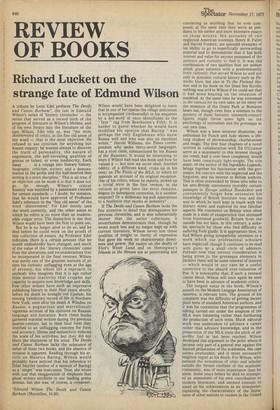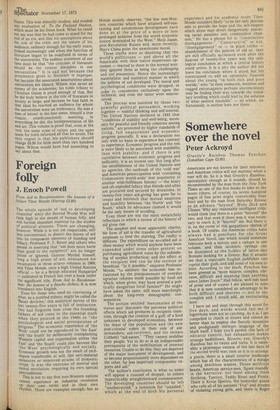R EVIEW
OF BOOKS
Richard Luckett on the strange fate of Edmund Wilson
A tribute by Leon Edel prefaces The Devils and Canon Barham*, the last in Edmund Wilson's series of 'literary chronicles' — the series that served as a record both of the progress of literature in Wilson's lifetime, and of his own forays into the literature of the past, Wilson, Edel tells us, was "the most ,disinterested of critics, in the fine Old sense of the word — that is the most objective. He refused to use criticism for anything but honest enquiry: he wanted always to discover the truth of personality, the nature of expression, the self-revealing qualities of genius or talent, or even mediocrity. Each essay . . is a voyage into literary history, biography, criticism, society: and a demonstration to the prolix and the half-hearted that writing is a stern discipline." This is all true; if an objection can be made it is that it does not go far enough. Wilson's critical honesty-was matched by a passionate concern for certain standards — I doubt, for instance, that he would have approved of Professor Edel's reference to the "fine old sense" of the word 'disinterested.' For Edel merely uses the word correctly, and the other sense to which he refers is no more than an inadmissible vulgar error. The distinction is one that Wilson wquld have been the first to point out. But he is no longer alive to do so, -anclhe died before he could work on the proofs of this collection of essays. As Professor Edel indicates, there is a certain amount that he would undoubtedly have changed, and much of the value of the 'literary chronicles' came from the alterations and reconsiderations that he incorporated in the final versions. Wilson was surely one of the greatest learners of all time his curiosity unflagging even at the age of seventy, his whole life a reproach to anybody who imagines that it is age rather than mental inactivity that cripples our capacity to acquire new knowledge and skills. Few other writers have such an impressive publishing history in their final years; shortly before his death he brought out Upstate, his moving valedictory record of life in Northern New York; soon after his death A Window on Russia, a pugnacious and marvellously vigorious account of his opinions on Russian language and literature. Both these books. garnered material written during the previous quarter-century, but in their final form they testified to an unflagging concern for form and accuracy. Illness and melancholy reduced the scale of his activities, but they did not blunt the sharpness of his mind. The Devils. and Canon Barham lacks the substance of either of these two books, and the absence of revision is apparent. Reading through his article on Maurice Baring, Wilson would probably have noticed that his reference to Ethel Smythe (author of a memoir of Baring) as a 'singer' was inaccurate. True, she wrote with just that exaggeration of emphasis that ghost writers attribute to our leading prima donnas, but she was, of course, a composer., Wilson would have been delighted to learn that in one of her operas the village policeman is accompanied (orchestrally) in his enquiries by a leit-motif at once identifiable as the " fate " tag from Beethoven's Fifth. It is harder to guess whether he would have modified his opinion that Baring " was perhaps the only Englishman who knew Russia well and who was also an excellent writer; " Harold Williams, the Times correspondent who spoke thirty-sevcn languages, has a rival claim, substantiated by his Russia of the Russians. It would be interesting to learn if Wilson had read this book and how he valued it — but now we never shall. Another oddity, of a different kind, crops up in his essay on The Fruits of the MLA, to which he appends an account of its original reception. One of his critics, whom he reports, picked up a trivialerror in the first version; in the version as given here the error remains, despite its subsequent correction. Is it another misprint? Or a deliberate leg-pull appropriate to a feuilleton that mocks at pedantry?
If The Devils and Canon Barham lacks the fine attention to detail that distinguishes his previous chronicles, and is also substantially shorter than the earlier collections, it nevertheless demonstrates that, though he wrote much less and no longer kept up with current literature, Wilson never lost those qualities of insight or clarity of expression that gave his work its characteristic directness and power. His essays on the drafts of .Eliot's Waste Land and on Hemingway's Islands in the Stream are as penetrating and convincing as anything that he ever composed; at the same time they serve as pendants to his earlier and more extensive essays on those writers. His accounts of two neglected American novelists, Henry B. Fuller and Harold Frederic, are splendid examples of his ability to go to superficially unrewarding material and to demonstrate that it has both interest and value for anyone possessed of the patience and curiosity to find it. It was this combination of two qualities that are seldom allied, great patience with a predominantly lively curiosity, that served Wilson so well not. only in domestic cultural history such as Patriotic Gore, but also in To the Finland Station and in his book on the Dead Sea Scrolls; nothing was arid to Wilson if he could see that it had some bearing on the situation of mankind. At the same time he was interested in the curious for its own sake, as his essay on the monsters of the Orsini Park at Bomarzo bears out, though even here a solution to the mystery of these fantastic sixteenth-century figures might throw some light on the psychology of surrealism and the grotesque in our own time.
Wilson was a keen amateur illusionist, an enthusiast for Punch and Judy shows, a lifelong student of showmanship, charlatanism and magic. The first four chapters of a novel written in collaboration with Ed O'Connor serve as a monument to this interest though the result, had it ever been completed, would have been consciously light-weight. The title essay, on the author of the Ingoldshy Legends, brings together his fascination with the grotesque, his concern with the neglected and the forgotten, and his interest in British authors. This is often overlooked by those who refer to his anti-British statements (notably certain passages in Europe. without Baedecker) and conveniently forget how extensive his knowledge of British literature was, and the way in which he both kept in touch with the literary scene and explored its less familiar aspects. His comments on Britain were often made in a state of exasperation that stemmed from frustrated goodwill; Britain from the outside has not been, in this century, a suitable spectacle for those who find difficulty in suffering fools gladly. It is appropriate then, to find Wilson giving sympathetic attention to a work, which our professional scholars have neglected, though it continues to be read with gusto by a small circle of admirers. Perhaps now that serious consideration is being given to the grotesque elements in Dickens there will be some renewal of interest — which would in any case be a useful corrective to the absurd over-valuation of Poe. It is noteworthy that, if such a renewal comes about, Wilson will once again be seen to have been in advance of academic critics.
The longest essay in the book, Wilson's assault on the Modern Langage Association of America, is relevant here. The ground of his complaint was the difficulty of getting decent plain texts of standard American authors, and it was his contention that the programmes of editing carried out under the auspices of the MLA were hindering rather than furthering the production of such texts. Much editorial work was undertaken to advance a career rather than advance knowledge, and in the preparation of the MLA' texts the pitch of absurdity had at last been reached. Wilson developed this argument to the point where it became only part of a general war against the learned philistinism of the academies. His case seems irrefutable, and it must necessarlY heighten regret at his death. For Wilson, who pursued the avocations of critic and scholar outside the formal confines of the academic community, was of more importance than he knew. Some years before he died he attempted an assessment of his own contribution to modern literature, and seemed content to stand on his achievements as an interpreter, explaining the. characteristics of the literatures of other nations to readers in the United
States. This was absurdly modest, and evaded any evaluation of To the Finland Station, Which must be his finest book. What he could not see was that he had come to stand for the end of an era, and that his assumptions about the role of the critic and the nature of his audience, ordinary enough for his early years, Inoked increasingly odd when the function of literature began to be redefined in terms of the universities. The saddest statement of our time must be that "the criticism of literature Should be the central discipline in our universities." It is sad not because the Prominence given to literature is improper, but because the associated assumptions about universities are absurd. Wilson was never an enemy of the academies; his noble tribute to Christian Gauss is proof enough of that. But he did truly believe in the role of literature in society at large, and because he had faith in that ideal he reached an audience for whom • the universities were an irrelevance. He was a Man of letters' in the best sense, himself a true creator, unselfconsciously asserting, in everything he did, the interpenetration of life and art. This volume is proof that, even at the end, the same scale of values and the same quest for truth informed all that he wrote. The only regret is that his publishers should Charge £4.50 for little more than two hundred Pages. Wilson would have had something to say about that.



































 Previous page
Previous page